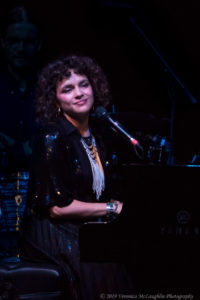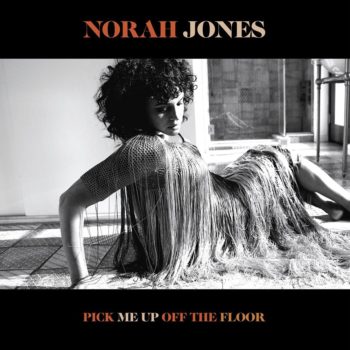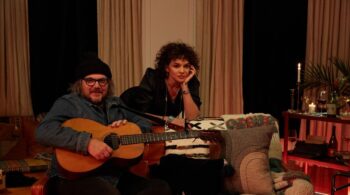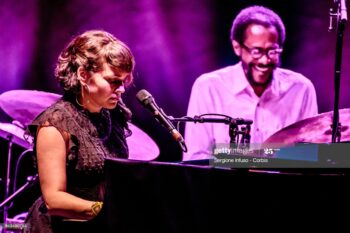Interview: Norah Jones Talks To The 13th Floor
We are very excited to bring you this exclusive interview with Norah Jones.
Norah’s latest album, Pick Me Up Off The Floor, is out now and gathering rave reviews. (Speaking of rave reviews, click here to read the 13th Floor Concert Review of Norah’s show, here in Auckland last year.)
A lot has happened since then, so listen in, or read along, as The 13th Floor’s Marty Duda catches up with Norah Jones.
Listen to the interview here:
Or read a transcription here:
M: How’s things in Brooklyn these days?
N: You know, it feels pretty good. I mean, it’s hot, so it’s not so bad staying inside anyway.
 M: That’s true. Well thank you for talking to me and congratulations on the new album. I saw you here in Auckland, I think it was a little over a year ago you played a show at the ASB theatre and it was a beautiful experience. I was wondering if you have any memories of that?
M: That’s true. Well thank you for talking to me and congratulations on the new album. I saw you here in Auckland, I think it was a little over a year ago you played a show at the ASB theatre and it was a beautiful experience. I was wondering if you have any memories of that?
N: Oh thanks. Yeah, you know, that feels like ten years ago now but it was about a year and a half ago right?
M: Yeah.
N: Yeah, that was a really fun tour. We had a good time on that one.
M: Excellent. Well, it’s interesting you say it seems like ten years ago, your song This Life on the new album has a line about life as we know it is over and that seems rather prescient now that all the stuff has happened. How do you feel about it?
N: I know. That song was sort of an after-thought that I thought would be like a bonus track. But I really liked it and now all of a sudden it feels very relevant.
M: And I see you’ve done a few online things. Are you managing to keep creatively busy during this time or what has it been like for you?
 N: I basically do these webcasts every week. I’ve done them every week since, gosh, I think since April or maybe into March even. It’s sort of a way for me to have a time to be creative. It’s actually been really nice for me, because my kids are little, I haven’t had a ton of time to be creative. So the fact that I’ve carved that out every week, that’s sort of my time. I do requests, and I kind of relearn old songs. And it’s been really nice because I don’t think I would sit down and be able to really play at all if I didn’t have that.
N: I basically do these webcasts every week. I’ve done them every week since, gosh, I think since April or maybe into March even. It’s sort of a way for me to have a time to be creative. It’s actually been really nice for me, because my kids are little, I haven’t had a ton of time to be creative. So the fact that I’ve carved that out every week, that’s sort of my time. I do requests, and I kind of relearn old songs. And it’s been really nice because I don’t think I would sit down and be able to really play at all if I didn’t have that.
M: Speaking of creativity, I’m just wondering, you’ve been doing this for a relatively long time now and you’ve worked with all sorts of people and released albums in different genres and whatever, what continues to drive your creativity at this point?
N: I don’t know. I think just the fact that I like it and I’m always thinking about little song ideas and putting them down for later. It’s like putting them in your pocket to go hang out with later. I guess I just love doing it. I love making music, even if I’m not feeling creative. It usually comes back in waves, so I’m not too worried.

M: That’s good. Like I said, you’ve worked with a lot of different people and one of the people that you worked with on this new album is Jeff Tweedy, which on the surface seems to be a kind of unusual combination but then it makes sense once you listen to it. How did that collaboration come about?
N: The last two years I was trying to make a single and I was actively trying to not make an album and through doing that I did all these little collaborations, little three-day sessions and one of the… I think the second person I called to do it was Jeff. We’ve known each other for years but we’ve never really sat down and made music together. We had so much fun and we wrote four songs and two of them were released as singles as intended. At the end of maybe a year and a half, I had all these extra songs from all those sessions and that’s what this album is and two of the songs are from the Jeff Tweedy session.
M: How did the two of you work together? Did you actually sit down and write together or was it kind of a long distance thing? How did it work?
N: No. I went to Chicago because I’ve always wanted to go to the studio. His engineer, Tom Schick, is someone who I used to work with in New York, so it felt like a real family vibe plus his son was playing drums. We just sat down for three days and we sort of noodled around. And at the end of three days, we had these three recordings, four recordings, four songs.
M: It looks like a pretty cool studio. I’ve seen pictures and videos, I’ve never been there myself. Does the environment that you’re working in like that help?
N: Yeah, totally. Also I think we worked really fast together. It felt very natural. He’s a great musician and we just kind of both switched around instruments and tinkered away.
M: One of the tracks on the album that’s a favourite of mine is Say No More and that’s also a co-write with someone named Sarah Oda is that right?
N: Yeah I love that one.
M: Who is Sarah and how did that come about?
N: Sarah, she’s probably listening right now. She’s one of my oldest friends from New York. I met her when I first moved to New York. Her sister actually used to be in my band, Daru Oda, years ago. Sarah and I have been close for a long time. She’s worked for me for a long time on the road, as a production assistant. Now she’s actually working with my manager and managing me, helping manage me but we’ve always sort of had creative collaborations on the side and she helped co-produce and she wrote some songs on my last album and she’s become quite a song-writer so she came to me with this song idea and so we just tried it and it worked out.
M: That track has a really cool, it almost sounds like a jam in the middle, with, I assume, you on piano. What was the recording session like for that? Are you guys all in one room playing together or is there over dubs? How did it come together?
N: I like to record live. With this album, we’ve mostly done, with the exception of the Jeff Tweedy songs and one other song, it was all recorded ‘piano trio,’ which I’ve been really enjoying for the last few years. Just me on piano and singing with bass and drums. We try to pick a good live take and we edit a couple of takes together if we need to or if we need to do overdubs we do but usually it’s a pretty live take. That one’s pretty live I think.
M: It feels it.
N: That’s Brian Blade on drums and Jesse Murphy on bass. It feels great yeah, it feels live. It IS live! It definitely wasn’t, ‘do the drum track and then add the piano, then add bass.’ That’s not how I do it.
M: Another track that I was hoping to touch on was Were You Watching. It is another co-write and the nice violin in there reminds me of Scarlet Rivera from back in her days playing with Dylan.
N: That’s funny, that’s what I kind of was going for. The band and I, we had already recorded the track, it was a piano trio then we added the harmonies and then I brought in Mazz Swift to play violin on it. I had that in my mind, but I didn’t want to tell it to her. You know you have to be creative with a great musician. You don’t want to tell her and say, ‘hey – sound like this.’ So I just didn’t say anything, but that’s totally what I had in my mind. And then she’s done it so great, I mean it sounded very different from Scarlet Rivera, but had flavours of that. And then I told her about it and she didn’t even know what I was talking about.
M: I know you did this kind of series of singles as almost kind of like an experiment or kind of a way to change the way you work, how has that experience affected you as you go on now do you think when you proceed on with your next project whatever that may be?
N: I’m gonna keep doing it I think. I mean, I think things are a little bit paused but I’m open to doing it remotely but it’s not as fun but we’ll see. I’ve loved it. It’s actually really stoked the creative fires. I definitely have written more songs in the last two years and been more creative and have more ideas than I ever have.
M: That’s interesting, I was thinking about that yesterday because back in the day, a lot of creative people, artists, bands seemed to kind of dry up and disappear after they turned thirty-five or so and that doesn’t seem to be the case, any more. Do you have any theory as to why that may be?
N: I think the modern world is all workaholics probably, other than that I don’t really have any theory. I don’t know.
M: It’s just that it seems like people are more accepting of the fact that someone who’s over, say forty, can still have a creative voice and do something that’s relevant and innovative, I guess. I don’t know.
N: I don’t know either. I mean, I’m not in the game of pop stardom and wearing sexy clothes. That’s actually a different business than what I’m in. I’m sure in that genre it’s harder, but I don’t know. There are so many pop stars now that are not twenty and they’re still looking great and putting out great music so, I don’t know. I think people are good at what they do and with the internet, I don’t know… I’m just talking now, I don’t have an answer. (Laughs)
M: (Laughs) Ok, that’s fine. So you’ve been doing this for a while now, how do you look at the trajectory of your own career? Did it go the way that you thought it would when you first started out fifteen, twenty years ago? Did you have kind of an impression about how you wanted things to go for yourself?
N: Nah, I was so young when my first album got huge. That was the greatest surprise of my life. It was definitely, you know, it was a crazy thing to happen to anybody and I’m super grateful for it. It brought challenges, but it’s been ultimately… I feel like I’ve been able to appreciate it. I feel like I’ve been able to take advantage of that early success in a way that I am proud of. I’ve made music I love. I’ve worked with different people. I’m still doing it. I feel really good. I could have never imagined any of this or planned it out and I wasn’t planning it as I go, I was just kind of doing it. Looking back, which I only do during interviews cause that’s the only time I think about it, because people ask, but I’m pretty proud of my career and I feel really at peace with everything.
M: That’s cool. For a lot of people, if they have that sudden surge of success right at the beginning, it’s almost like the beginning of the end for them because they are constantly trying to recreate that vibe or whatever it was that made that happen. And for you that wasn’t the case. Did you go through any of that thought process when that all was happening to you?
N: I think that I was able to sort of shelve the pressure and expectations. When I went in to make my second album, I was feeling creative and I was feeling excited about music just like I did when I was making my first album and I didn’t let all that stuff into the studio, so no. And I was very lucky to fall in with a label that was nurturing for a young artist and kind, and managers who were not trying to steer me creatively. I was also very stubborn when I was young and very strong willed. I still am, but I’m definitely more open to ideas, other people’s ideas now. But when I was young, you just kind of, you don’t know any better, you’re just like, ‘I’m doing it my way or whatever.’ I don’t know, I had a group of friends and a band that I loved and we were just always, we were just making music, it wasn’t rocket science but it came from the heart and I think that’s kind of all that matters.

M: The one person that you’ve worked with quite a bit who I see on covers and credits all the time, is your drummer Brian Blade and I’m wondering from your perspective, what makes him the guy you want to go to, to have back there behind the kit?
N: I’ve been a fan of Brian’s since I was probably seventeen and I went to go see him play with Joshua Redman in Ft Worth, Texas. And when I moved to New York I used to go see him play at Smalls all the time with Sam Yahel. And I would sit in with them because I got to know Sam, he was my piano teacher. I loved Brian’s playing so much. There’s just something about the way he plays. He has such a great groove, its sensitive and he also plays to the lyrics really in a way that is really unique. I really wanted him on my first album so he played on my first couple albums and then I didn’t really see him for a long time after that. He’s pretty busy but, yeah, the last two albums he’s been a really big part of.
M: It’s nice to be able to have someone like that to call on, I would imagine. When you’re actually recording with him, is there a communication that happens between you? Is it verbal, is it musical? How do you interact?
N: It’s not very verbal. I mean he takes direction well, he’s a pro. But it’s so much nicer to just sort of let the song happen and see what he comes up with because he comes up with stuff that I could never imagine.
M: Getting back to the ‘life as we know it is over’ concept, how do you see things going forward? Do you think it’s gonna get back to normal? Do you think that all this stuff that’s happening… because it’s more than just the covid virus, in the states it’s political, it’s social. There’s all this stuff happening… do you think about that stuff and are you concerned about how it’s gonna affect you in the next two or three years?
N: Of course I think about it. I’m less concerned about myself and my career and more concerned about how it’s gonna affect my kids. I mean, they have no social life. They’re four and six, what is this gonna do to them? Is school gonna come back in a year and when it does, are they gonna know how to behave around other people? I have no idea. That’s the biggest concern I have for all the people, all over the world, but especially in the United States. It’s a very scary time right now, politically and there’s a lot to think about and keep you up at night and worry about, but I’m not. If I can’t tour for five more years it’s ok, I’ll be fine. I don’t know what this is gonna do to people’s mental state. We have so much work to do on ourselves. I hope that the entire world and the United States, I hope that we can try to take some lessons from all this, but I don’t know. We shall see. I have no predictions.
M: (Laughs.) That’s probably smart.
N: Only worry.
M: You read the news everyday and it’s like some days you feel kind of optimistic, oh things are going in the right direction and some things are gonna change and other times it’s just like, ‘what a mess’, you know, it’s like what are people thinking? So I don’t know.
N: It’s definitely a mess.
M: That’s for sure.
N: We have time for one last question.
M: So looking forward, as we just were, what do you see as your next release project whatever it is that you’ve got planned next?
N: I’ve got no plans. I take it as it comes. We shall see…
